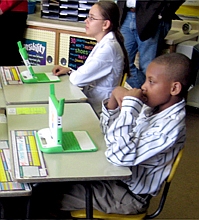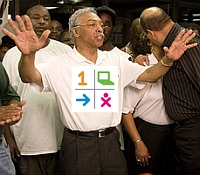Where is OLPC America? The organization and its leadership are conspicuously silent since Nicholas Negroponte's announcement.
In this void, communities across the United States are charging ahead with low-cost laptop programs. They are making changes at the city and state level to introduce the XO laptop into school systems, often without a full understanding of the costs or benefits of an OLPC-empower learning shift.
Birmingham Starts 1,000 laptop Pilot
Congratulations to Mayor Larry Langford and the children of Birmingham, Alabama! They'll be participating in the first large-scale One Laptop Per Child program in America. Yesterday the Birmingham Board of Education accepted 1,000 XO laptop computers for a pilot program at Glen Iris and possibly one other elementary school. The Birmingham News announced that:
The first 1,000 computers, called XO laptops, are part of an initiative by Mayor Larry Langford and the Birmingham City Council to put laptop computers in the hands of first- through eighth-graders in the city school system.Yet before anyone reaches for the champagne, remember this is a pilot program, the board has not accepted all 15,000 low-cost laptops that the city agreed to buy from OLPC. In addition, it will be a crash-pilot, from April 15 to September, that will need to show results by August, when the other 14,000 XO's are secluded to arrive from Quanta.
Then there's the cost. The Birmingham Weekly reports that:
The school system has estimated that setting up Glen Iris Elementary for the pilot program would cost as much as $30,000. Board member Phyllis Wyne questioned whether the $500,000 promised to the school system by the city would be enough to wire all 31 schools for the program.OLPC America would do well to give the Birmingham BoE some guidance and reassurance as to the costs of a school's infrastructure, or a full rollout to multiple schools. Better yet, OLPC America could work with the BoE to make sure its pilot assessment metrics can accurately measure impact in such a short time frame.The mayor’s office had proposed giving the computers to all students in the Birmingham schools, but Councilor Royal pointed out Thursday night that the funding is not enough to pay for that many computers. The city has agreed to buy 15,000 XO laptops from OLPC for $3,000,000. There are approximately 28,000 students enrolled in Birmingham schools - 13,000 more students than computers.
Illinois Low Cost Laptop Act
Now imagine a Birmingham program on a state-wide level. That's the dream of Illinois Lt. Governor Pat Quinn and his Low Cost Laptop Act:
The Children's Low-Cost Laptop Act (HB 5000)... would establish a statewide program to provide elementary school students in up to 300 schools with low-cost laptop computers for academic use. All elementary schools and school districts in Illinois would have the opportunity to submit an application for laptop funding.OLPC News contributor and OLPC Volunteer Ed Cherlin analyzed the finer points of the Act, and his results may surprise you:"Laptops are the textbooks of tomorrow, and no Illinois child should be left on the wrong side of the digital divide," Quinn said.
As usual, the Devil is in the details. This [bill] says nothing about how to choose the laptops. Will the authorities decide to buy as much hardware as they can for $400 per unit? Or will they understand that the XO hardware and software are designed for the mission?Ed concludes that the authors of the bill have little idea what One Laptop Per Child is about or its true promise for education. That there is a real need to educate political leaders on the full requirements and metrics of technology-empowered learning.Furthermore the bill explicitly provides incorrect criteria for evaluating the project. The report must include the project's effect on:
Items 1 and 3 specify the use of standard tests for evaluating the program. If this bill becomes law, the education authorities will be prohibited from evaluating the children's interest in learning, whatever they learn outside the curriculum, or their progress in collaboration, independent learning, discovery, creativity, or problem-solving.
- academic progress of students who are participating in the pilot project, as measured by performance on assessment instruments;
- student progress in schools or classrooms participating in the pilot project as compared with student progress in schools or classrooms not participating;
- student performance on assessment instruments required by the State Board;
Several laptop programs in the US have been shut down because they did not evaluate any of these things, and produced no significant gains in standard test scores.
The need for OLPC America
Wasn't this the very role for OLPC America? To combine experts in education and legislative maneuvering that can show how education using the XO is supposed to work, teach a bit of it to the legislature and the public, and then make sure that that understanding informs any bill on the subject.
I will give OLPC Chicago great credit in getting the ball moving, and mad props to Mayor Larry Langford in making OLPC Birmingham happen.
But wouldn't both be helped by an active and visible OLPC America?





I'm glad to see the OLPC Project getting a good opportunity to show the world, in a relatively short period of time, the impact that the XO may have on a child's education.
A USA state (like Alabama) is perfectly equipped to provide the ideal testing conditions: there is government money to fully fund the project, there is internet access, there is a solid board of education to measure impact, there are teachers and there are schools in good condition.
It is all very interesting!
I wish I were quite as cheerfull as Irvin.
Yes Alabama is perfect for roll-out practice: An almost bankrupt Birmingham City School system and children in dire need of educational chances.
But the Board of Education doesn't get it. Neither the ones voting on the ("unsoliceted gift") proposal, nor the crew putting the hardware in place. There is no outreach to the community.
There are intersted and very motivated geeks and nerds and parents and other well meaning parties around, but neither city nor BoE integrate them. They are so overwelmed by the implications of this project that they don't want to get cought showing their lack of controll and knowledge.
I hope they'll wake up and accept help before they damage the project's reputation.
Save some money! One USB memory stick per child!
In the US, a lot of kids will have their own laptops. This itself is a reason for schools to have laptops as well, to ensure some level of equality between students who have laptops and those who don't. The school should treat them as library books, things which can be signed out and returned as needed. The XO in particular is not a laptop you can argue should be owned by a single child because the child will personalize the machine: every time its upgraded it's wiped and returned to a new state -- that's regarded by a virtue by OLPC, and has led to enon creating the ( http://olpcnews.com/forum/index.php?topic=2418.0 ) 'one laptop per adult' script to make it easier to restore to an adult usable state.
All kids should have their own usb memory stick to keep stuff longer term and to use on different machines. If a school can only afford XO's equivalent to 50% of the students, that doesn't need to be a show stopper. For some schools that could be more than enough.
Granted, that does raise the question of how to get Sugar running with mesh on a rich kid's uber Vista laptop for participation in the Sugar classroom experience, but for the US liberating Sugar from the XO ghetto should be an important question.
"Liberate Sugar from the XO ghetto" - a revolutionary rallying cry!
""Liberate Sugar from the XO ghetto" - a revolutionary rallying cry!"
If it's not about laptops but rather education, how about Sugar as a free, open source, application suite with versions for Linux, OS/X and Windows? Spread the love!
There would still be a role for an ultra affordable Sugar based educational appliance, but in places like Canada and the US where a heterogeneous mix of hardware already exists in the hands of kids, why not capitalize on what they've already got?
Who needs a memory stick. Sign every kid up for a google account. Online storage using google docs. That's the answer.
Let's look at the Illinois situation. It's being judged on the standardized testing. That is the norm and currently only accepted manner for evaluating education. If it doesn't improve test scores, why are you doing it?
This gets into a bigger discussion of NCLB. This program doesn't care that students are becoming "learners" as a result of the XO or other technology. It doesn't care that student motivation is improving. The school, not the necessarily each student, must be improving.
In addition, NCLB influences other sources of money from people who don't "get" it. In grant writing, if you can tie your proposal into what NCLB is trying to do, then it is more likely to be accepted and funded.
As teacher, I'm pulling every bit of technology into my classroom and school that I can because it will make a difference. We have gotten SmartBoards in some classrooms, audio enhancement, video projectors, document cameras, wireless keyboards, and others. All of these improve student motivation, attendance, and success. Will it increase test scores? I hope so. However, my students using laptops, technology-assisted reading, and all the other technology that I can find, are on-time to class, willing to write more, more engaged, eager to find answers, and becoming life-long learners.
Of course, I want them to do well on the tests. What teacher doesn't? However, I am much more interested in having them connecting to school, peers, and adults. I am interested in instilling a love of learning, a desire to find information, and an eagerness to share all of it with others. Technology has had an amazing impact in this area.
Board member Virginia Volker questioned whether the proposed pilot was truly a pilot program. Volker asked whether it was the city’s intention to distribute the remaining 14,000 laptops, no matter if the pilot system succeeded or failed. Neither the council nor the mayor’s representative gave a clear answer. Langford did not attend the meeting.
Does Birmingham use an all-year school calendar? If the "pilot" starts in April, school ends in May/June and restarts in September, when the "pilot" ends how much data will be collected? Also, the article implied the XOs are purchased already and the decision is where and when to distribute them. From the article they could end up in a warehouse.
Yes. Agree. I have long time not buy textbooks from university college bookstore and instead I buy textbooks from online bookstores. For example, I buy all my textbooks for this semester from Cocomartini.com Online Bookstore.
http://www.cocomartini.com/
70% off discounts textbooks and all are brand new textbooks. That's great!!!!
@ hagbard c
that whole bit about sharing the laptops might be good temporarily, but it really wouldnt be such a good idea in the long term. you talk of personalizing like it's a bad thing and talk of laptops as if they grow on trees.
if the kids are sharing them then who is held accountable when one breaks? what about diseases? if you have ever gone to a public school, flu season is pratically a low grade plauge. with kids swapping laptops back and forth, there could be days when half the kids are out of school!
as for the sharing, pretending that it was even physically possible (which it really wouldnt be if the plan was to make full use of the machines for every class) should one be broken by a kid who was a jerk, or just didnt care, then what would the kids who didnt break it do? sit around and do nothing? work on paper while everyone else was mesh networking? share with another student perhaps? should they put the laptops in every room and have the kids be responcible for just their usb then you are only creating problems and no solutions. should you have a limited number of the laptops then you are creating a ripple effect of problems should one or two break. Should the kids have to bring in their own computers then there will be class difference...which could cause all sorts of other problems that are too big complex to cover here
@wayan
if you have an XO dude i have good news for you. if you find the list of apps that they have on wikipedia (search for sugar applications) you can scroll down to the bottom and find an emulator for one of the original mac operating systems. i would actually use it as opposed to sugar (i really dont care much for sugar) but as of now thats not really possible (too feature limited and not enough software for it)